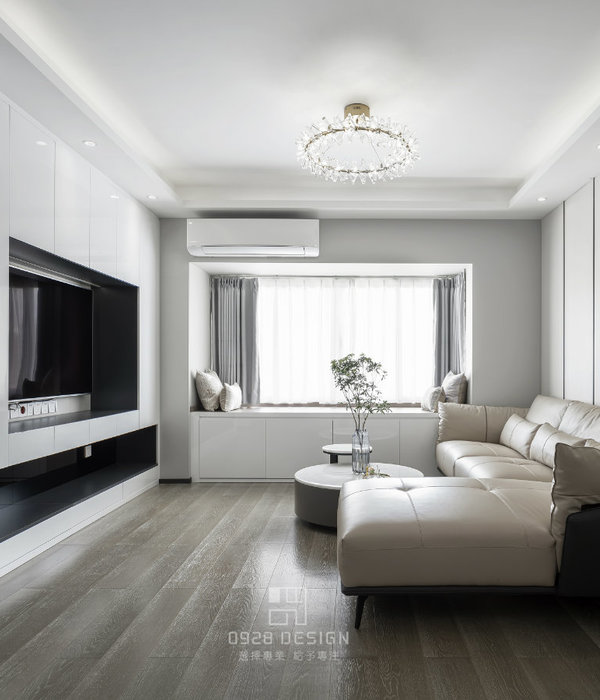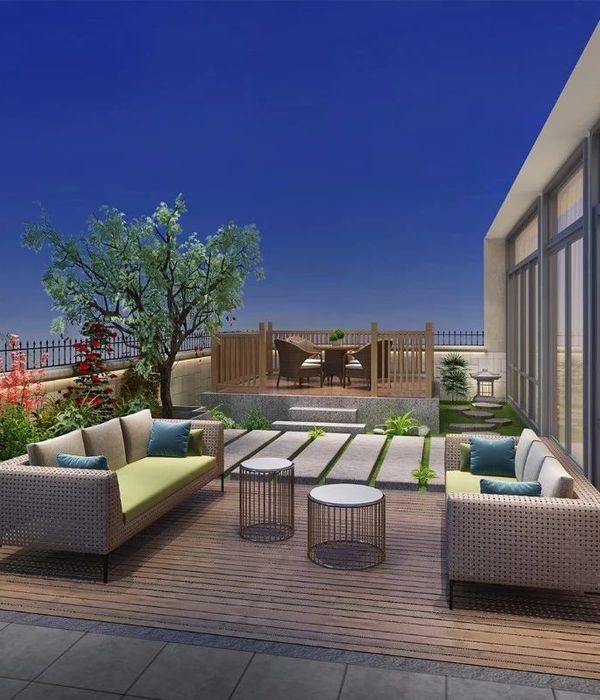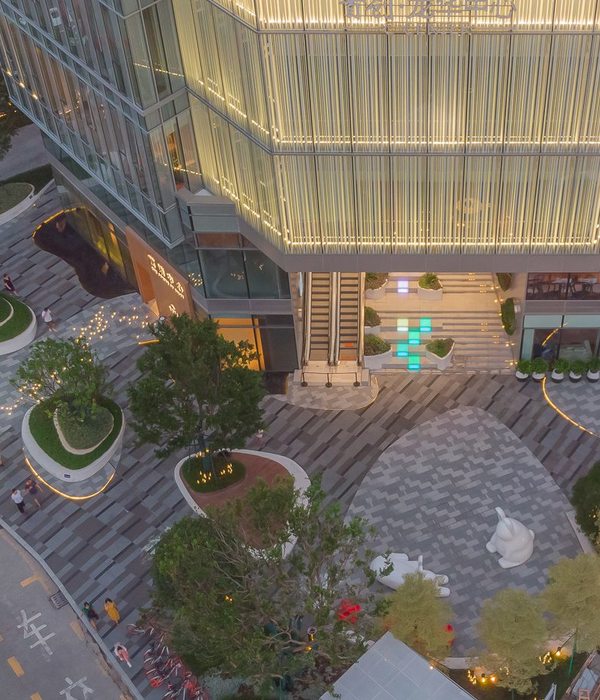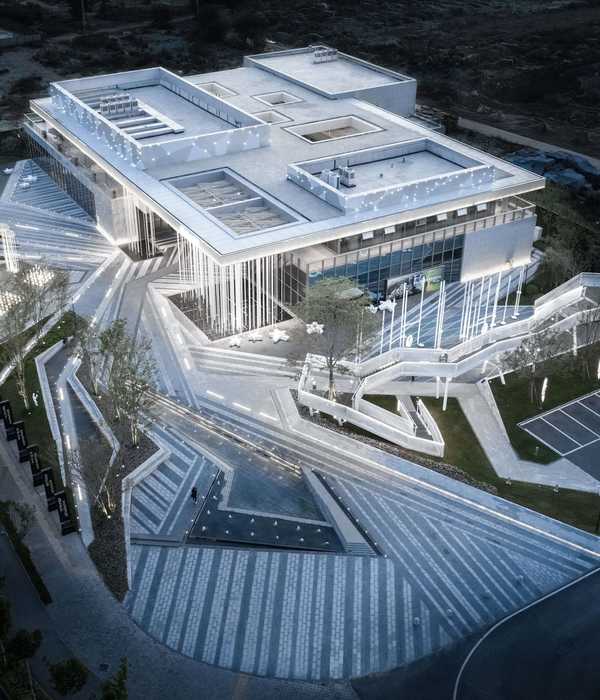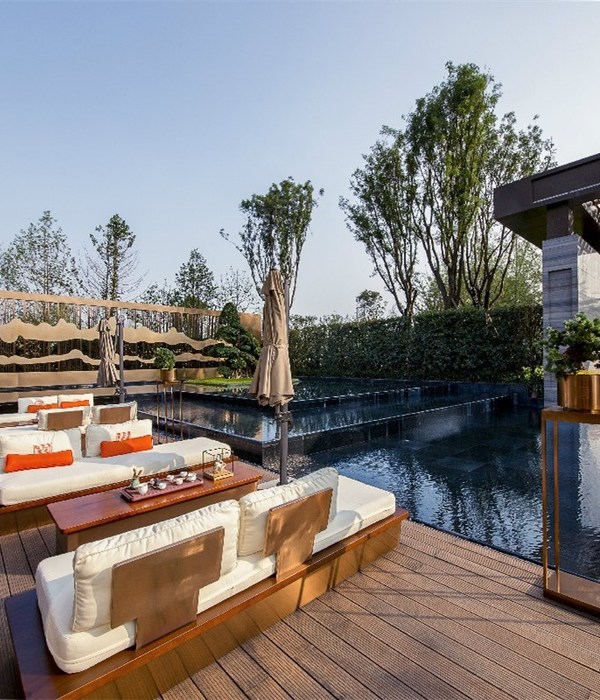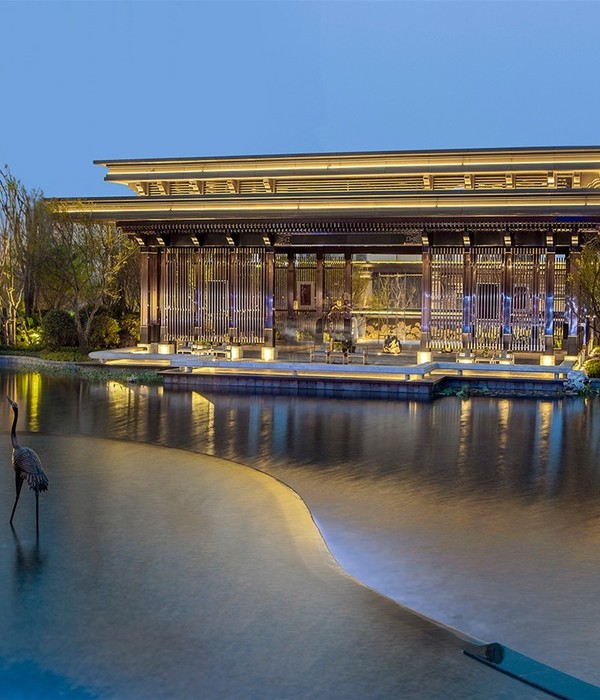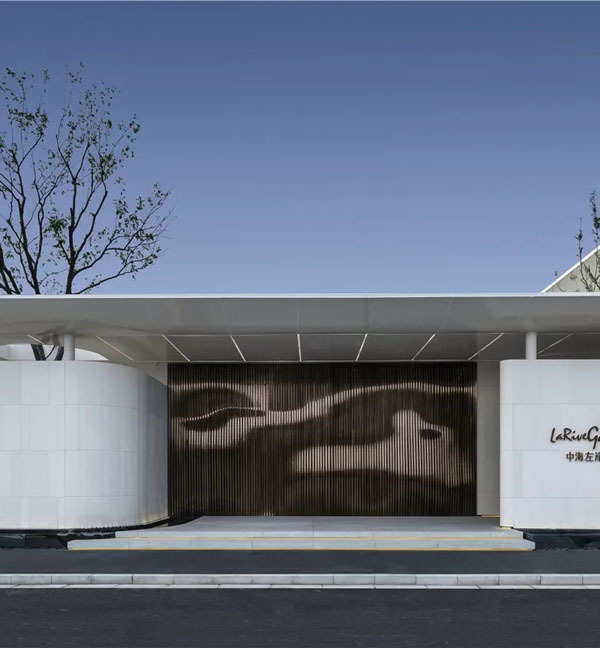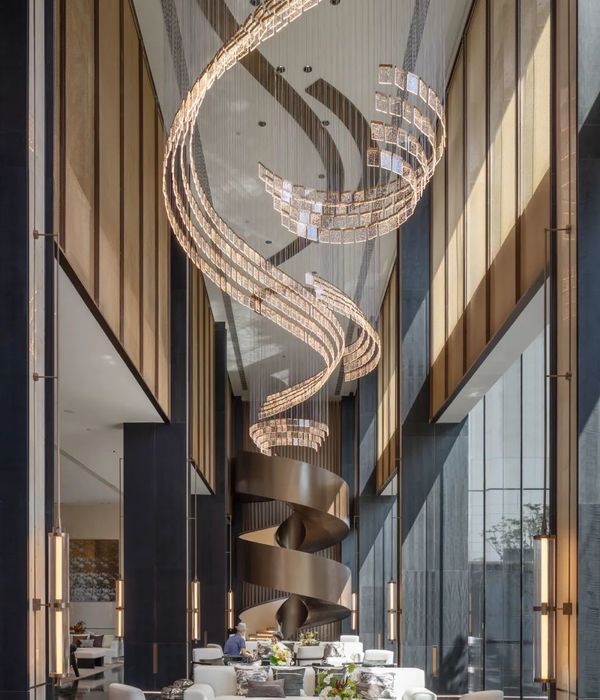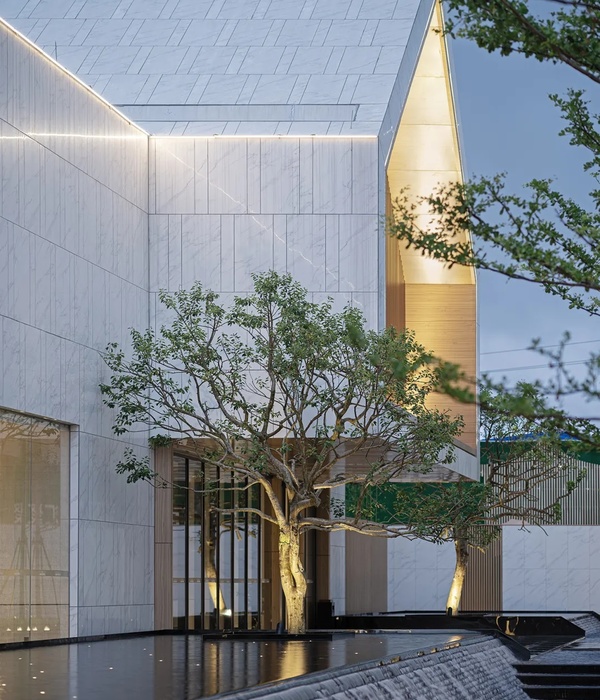优加设计:沐沣悦汤泉酒店位于中国陕西的沣西新城,归隐自然原野,又与城市咫尺之遥。它是城市与自然相融合的交界之地,是宁静雅致的世外桃源。设计师通过“自然而然,顺势而为”的建筑哲学,将他打造成一座外在质朴、内在丰富的雅致空间。
STUDIO A+: Situated in Fengxi New City, Shanxi Province, China, the Mu Feng Yue Hot Spring Hotel emerges as a serene retreat, nestled in the natural wilderness yet mere moments from the urban bustle. This hotel represents a seamless fusion of city life and nature, providing guests with a peaceful and refined sanctuary. The architectural approach adopted here emphasizes harmony with nature and thoughtful adaptation to the surroundings, resulting in a design that boasts a rustic façade paired with a rich interior.
▽项目视频 video ©直译建筑▽宁静雅致的世外桃源 A quiet and elegant hideaway
▽外在质朴内在丰富的雅致空间 Elegant space with simple exterior and rich interior
▽整体鸟瞰 Overall aerial view
这里塑造的不是建筑,而是一个环境。设计师通过设置一系列墙体重新定义和编辑场所,将空间加以折叠与展开,并将这一“环境”融进了其所处的更大的环境之中。
This establishment isn’t merely a structure; it’s an environment crafted through strategic placement of walls that redefine and choreograph the space. These walls fold and unfold the spatial experience, integrating the “environment” with its larger context.
▽墙体将空间加以折叠与展开 The walls fold and unfold the space
▽墙体局部 Part of wall
从自然中生长出的东方韵味 Enigmatic Allure Emerging From The Land
因地制宜的下沉庭院,让建筑仿佛从自然中生长出来;采用黄土色清水混凝土保持与大地相似的色彩与质感,不冲击和破坏城市风景;还有极具东方韵味的架空“米纸灯笼”茶室、静水面、水楼梯和水面橙色玻璃亭,为整个建筑增添了神秘色彩。
The sunken courtyard, tailored to the local condition, gives the impression of the structure emerging organically from the land. The choice of materials such as rich earth-toned, timber-textured bare concrete complements the natural hues of the surroundings. Key features include the ethereal “rice paper lantern” suspended tearooms, reflective pools, sloping water surfaces, and Zen-inspired orange glass pavilion set over water, all contributing to the hotel’s enigmatic allure.
▽从自然中生长而出的建筑 A building that grows out of nature
▽极具东方韵味的庭院景观 The garden landscape with Oriental charm
▽“米纸灯笼”茶室通向水面橙色玻璃亭 The “Rice paper Lantern” tea room opens onto the water’s orange glass pavilion
▽透过落地窗看庭院 Look at the courtyard through the floor-to-ceiling Windows
▽拱形走廊 Arched corridor
▽黄土色清水混凝土墙面细节 Loess color plain concrete wall details
这座 3,440 平方米建筑规模的酒店为宾客提供 6 间豪华客房,每间均配备私属室内汤池,同时还设有 8 个带有私人淋浴和休息区的户外汤池。
This 3,440 square meter hotel provides 6 luxurious guest rooms, each with its own indoor pool, while 8 outdoor pools with dedicated showers and lounges are also available to visitors.
▽户外汤池 Outdoor soup pool
精致的餐厅和茶室为宾客供应地方特色茶品和美食。酒店的 10005 平方米用地面积允许相对宽松而舒适的景观布局,包含了花园、水景、大草坪和季节性花海。酒店营造了隐逸安宁的心理氛围,对于那些处于精神困境中希望寻找放松与疗愈的都市人来说,这里是一个极具吸引力的选择。
Fine dining halls and tearooms specialize in local flavors. The hotel’s 10,005 square meter of the land area allows for a sprawling layout that can include gardens, water features, lawns and seasonal flower seas. The hotel becomes an attractive option for those wishing to find peace and indulgence in an urban oasis.
▽餐厅茶室与凉亭夜景 Restaurant Tea room and gazebo night view
▽酒店的季节性花海 The seasonal flowers of the hotel
因地制宜,尊重与利用场地 Respect And Utilize The Site
值得一提的是,项目与城市泵站和配电站结合在一起,新的结构需要建立在原有结构之上,受到已有设施的制约。因为泵站深处地下二层,为了减少土方回填,设计师从地下一层开始规划建筑功能,因地制宜,巧妙利用地形,设置了下沉庭院,并通过两个方向的绿坡与地面层相连,既为甲方节省了造价,亦体现出了人工建造对自然场地的尊重与利用。
Notably, this project adeptly incorporates an urban pumping station and a power distribution facility buried on the second underground level. The building was constructed atop pre-existing structure, constrained by the limitations of the site. In order to minimize earth backfilling, the architect has strategically positioned the building functions starting from the first basement level, ingeniously using the landscape to craft a sunken courtyard connected to the ground level via green slopes on two sides. This approach not only reduces costs for the developer but also demonstrates a profound respect for and utilization of the site natural condition.
▽下沉庭院通过两个方向的绿坡与地面层相连。The sunken courtyard is connected to the ground level by green slopes in both directions.
▽与室内大楼梯同步的室外“水楼梯” Outdoor “water staircase” synchronized with the interior grand staircase
▽绿坡夜景 Green slope night view
可持续建筑 Sustainability。另外,项目中设置了温度感应可智能开启的天窗,可促进空气流通,调节室内微气候,同时为室内公共空间引入垂直方向自然光。同时设置了采光筒将自然光引入地下层,达到节能降耗的目的。此外还设有大量种植屋面,净化空气、合理回收利用雨水的同时还能为室内空间降低温度。这些环境敏感性设计为日后甲方的长期运营极大地节省了成本,反映了设计对可持续建筑的承诺。
Moreover, the project features temperature-sensitive skylights that smartly open to enhance air circulation and adjust the indoor microclimate, infusing vertical natural light into public spaces. A series of light-guiding tubes channel daylight to lower levels, promoting energy efficiency. The rooftop, abundant with greenery, purifies the air and harnesses rainwater, offering energy savings and cooling for indoor spaces. These environmentally sensitive designs significantly reduce long-term operational costs, reflecting a commitment to sustainable architecture.
▽私密户外汤池兼做采光天井 Private outdoor soup pool doubles as light patio
▽室内局部及客房内部 Interior parts and room interior
▽总平面图 General plan
▽首层平面图 Ground floor plan
▽屋顶平面图 Roof plan
▽地下平面图 Underground plan
▽立面图 elevation
▽剖面图 Section
▽细部大样 Big details
项目名称:沐风悦温泉酒店
项目地点:中国,陕西,沣西新城
建筑面积:3,440 sqm
用地面积:10,005 sqm
建筑高度:8.4m
设计团队:STUDIO A+(优加设计)
主创建筑师:王敏
团队成员:王敏、丁梅、王玉良、李辉、王轩、王崇硕、张雯雯、许斌、施国珍、刘科峰,等
设计团队:
室内设计:公共区域——STUDIO A+(优加设计);客房及汤池——西安西旅文化旅游发展有限公司
结构设计: 北京清华同衡规划设计研究院有限公司
机电设计: 北京清华同衡规划设计研究院有限公司
幕墙顾问:哈尔滨工业大学建筑设计研究院有限公司
灯光设计顾问: 北京宁之境照明设计有限责任公司
景观设计顾问: 西安共生建筑景观规划设计有限公司
甲方: 陕西沣西新城投资发展有限公司
设计时间:2019 年 8 月-2021 年 1 月
施工时间:2021 年 4 月-2023 年 8 月
施工方:陕西建工沣西建设有限公司
主要材料:黄土色木纹清水混凝土、耐候钢板、聚碳酸酯板、超白钢化夹胶玻璃做数码打印、极窄边框大型可移动门窗、温控可开启天窗系统、导光筒,等
摄像师:庞家森
设计通过“自然而然,顺势而为”的建筑哲学,打造一座外在质朴、内在丰富的雅致酒店空间。
{{item.text_origin}}

